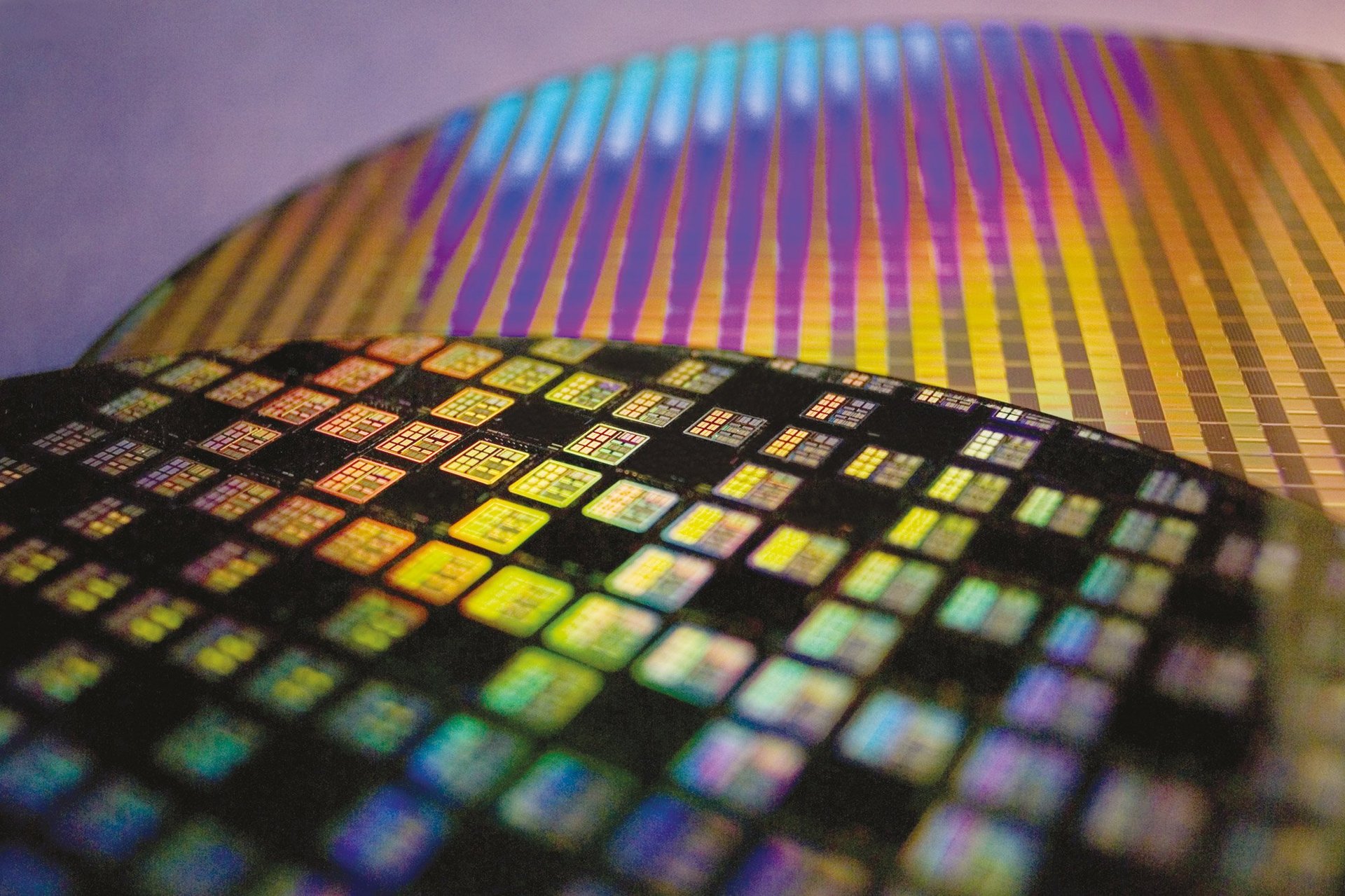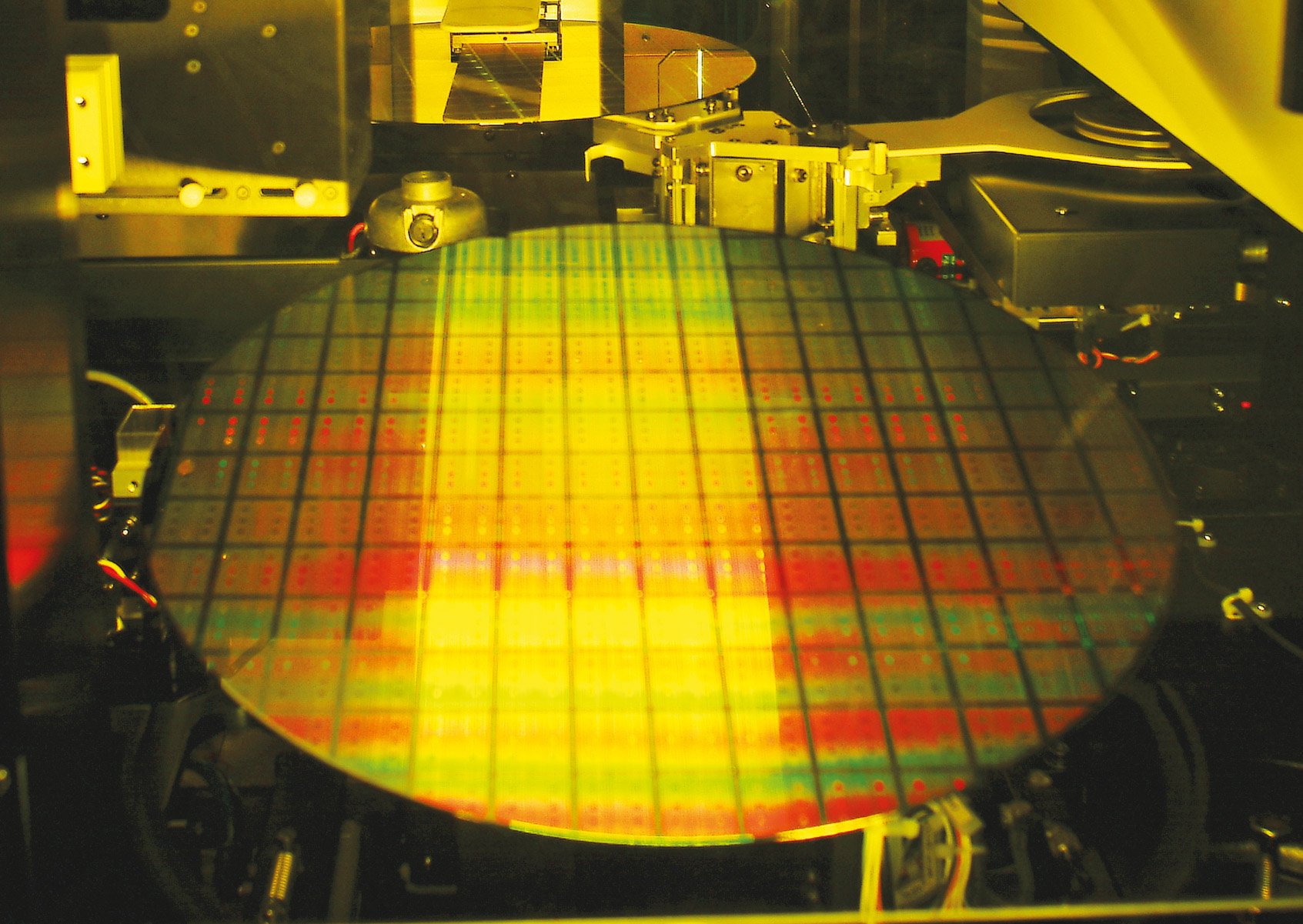
May 2021
All investment strategies have the potential for profit and loss, your or your clients’ capital may be at risk. Past performance is not a guide to future returns.
What is no bigger than your fingernail, something you use multiple times a day but can’t see?
A semiconductor1.
What are the most important technology companies you haven’t heard of?
TSMC and ASML.
To say semiconductors are essential to electronic devices is arguably inane; maybe to say they are essential to everyday life is fairer, and perhaps even closer to the truth is that they are responsible for powering phenomenal technological and societal advancement.
The Positive Change portfolio seeks to invest in companies whose products and services are providing solutions to global challenges. So, it’s perhaps unsurprising that Tesla (transforming the automotive sector), Moderna (unlocking a new paradigm of medicine) and Safaricom (providing connectivity and access to financial tools in Kenya) are all holdings. But when we say that we own a semiconductor equipment manufacturer (ASML) and semiconductor manufacturer (TSMC), we’re often met with curiosity. In fact, I would argue that the change delivered by Tesla, Moderna and Safaricom would be impossible without the existence of ASML and TSMC. Semiconductors are at the heart of technology, they are the building blocks of the innovation that powers societal progress, and yet they can be overlooked for their importance in driving positive change.
1. Semiconductors are a series of electronic circuits printed onto a conducting material (usually silicon). They form the brains of devices, determining their capabilities and functionality.

In his 2010 Ted Talk, the late and great Hans Rosling recounted the arrival of his family’s first washing machine and his mother saying, “Now Hans, we have loaded the laundry. The machine will make the work. And now we can go to the library,” and went on to energetically tell his audience “Because this is the magic: you load the laundry, and what do you get out of the machine? You get books out of the machines, children’s books. And mother got time to read for me… (and) she got books for herself.” He then went on to thank industrialisation, steel mills, power stations and the chemical processing industry, all of which contributed to making washing machines possible. Semiconductors also play their role in programming washes. Laundry is mundane, but the washing machine is miraculous in saving (predominantly) women the labour of finding, transporting and heating water before the labour of washing, and for freeing up their time to spend on something more enjoyable and productive.
“The cause is hidden. The effect is visible to all”
The Cause:
ASML’s incredibly complex lithography machines2, software and services play a critical role in the manufacturing of semiconductors, enabling its customers to increase the power of semiconductors and lower their costs, helping power what is known as Moore’s Law3. By enabling greater processing capability, ASML is contributing to technological advancement; in reducing the cost of computing power, it is helping democratise access to new and life-changing technologies, whether it be mobile computing, medical devices, electric vehicles or quantum computing.
TSMC manufactures semiconductors – using ASML’s equipment – on behalf of its customers, saving them the significant outlay ($10–15bn) of building a semiconductor factory (or ‘fab’ as they are called in the industry).When it was established in 1987, TSMC disrupted the status quo by paving a way for leading chip companies like NEC and Fujitsu to outsource production, thus saving enormous financial investment and time. Today TSMC’s services allow its customers to focus on their areas of speciality (design) and for the economies of manufacturing at scale to be shared across the industry, hence enabling faster innovation at a lower cost.
The Effect:
The effects enabled by these companies are far reaching and profound, perhaps most importantly in connectivity. ASML and TSMC have played a crucial, but seldom recognised or lauded, role in reaching the milestone of over half of the global population being connected to the internet. Semiconductors made by TSMC using ASML’s equipment have enabled the rollout of network infrastructure (2G, 3G, 4G and now 5G networks) across the globe and price deflation in mobile devices. Connectivity has many benefits. Crucially, it enables greater access to information that can expand knowledge and aid decision making; it provides access to vital tools and services such as an ability to make safe payments and means of transferring money and it brings sellers and buyers together. Connectivity can enable inclusivity and productivity, making it an incredibly powerful tool in addressing poverty.
Semiconductors are powering more than universal connectivity – they are enablers of the energy transition, electrification and monumental change in the healthcare sector where genetics, data and machine learning are helping us understand biology and develop novel diagnostic tools and new paradigms of medicine. So ASML and TSMC are powering positive change in several dimensions and across each of our four positive change themes (Social Inclusion and Education; Environment and Resource Needs; Healthcare and Quality of Life; Base of the Pyramid).
2. Using light, lithography machines print patterns onto silicon wafers to form electronic circuits on the silicon to create the chip.
3. Gordon Moore, co-founder of Intel, predicted in 1965 that the number of transistors on a chip would increase (doubling every year for the first decade and then revised to a doubling every two years) while the cost of components would fall.




Social Inclusion
and Education
MercadoLibre depends on connectivity for its ecommerce business and fintech services.
Alibaba’s ecommerce infrastructure and digital technologies depend upon semiconductors.
Environment and
Resource Needs
John Deere’s See and Spray technology uses sensors, cameras and machine learning to identify what is weed and what is crop, reducing the volume of herbicides used by nearly 80%.
Semiconductor content in EVs is estimated to be twice that of internal combustion engines today, and fully autonomous vehicles of the future could have 8–10x as much semiconductor content by value.
Healthcare and
Quality of Life
Dexcom’s continuous glucose monitors that help diabetic patients better manage their condition use semiconductors in the transmitters and receiving devices.
Patients gain access to Teladoc’s virtual healthcare over mobile devices powered by semiconductors.
Base of
the Pyramid
Safaricom, Kenya’s largest mobile phone operator, uses semiconductors in its mobile network infrastructure and its mobile payments platform, m-Pesa, depends on affordable mobile devices powered by semiconductors.
Semiconductors play a central role in the operation of Bank Rakyat’s 990 ATMs and cash deposit machines and enable its digital banking services.

Interestingly, the cause (semiconductors) of the effect (innovation across multiple industries) is growing in visibility as the confluence of rising demand to support multiple innovations, supply disruptions and escalating political tensions lead to global shortages of these tiny and unseen pieces of tech, with ramifications in a range of industries from auto manufacturing to consumer electronics. TSMC and ASML might not be the most important tech companies you have never heard of for much longer; they might become the most important companies you learn more about.
It is not only the likes of ASML and TSMC that pique the interest of those following Positive Change, but also companies like MercadoLibre and Shopify. Like ASML and TSMC, this is another cluster of companies we would describe as enablers driving positive change.

The dictionary definition of an entrepreneur is ‘a person who sets up a business or businesses, taking on financial risks in the hope of profit’. MercadoLibre, Latin America’s largest ecommerce and budding fintech company, describes the entrepreneur as ‘the vehicle to achieve an equitable, more democratic economy and to create an authentic transformation in society and on the planet’.
As a company aiding entrepreneurs through providing access to customers, the infrastructure to service customers and the financial tools to operate and grow their businesses, MercadoLibre plays an important role in facilitating job creation, rising incomes and social mobility.
Shopify, much like ASML and TSMC, is another company you are unlikely to have heard of but probably engage with regularly and plays a similar role to MercadoLibre. Shopify provides an operating system for online retailers – it works in the background when we purchase goods online, providing merchants with a means to accept and process payments, engage with customers and ship their products. Shopify wants to lower the barriers to business ownership and to make commerce better for everyone; its founder, Tobi Lütke, is passionate about democratising commerce and empowering independent businesses.
Shopify and MercadoLibre were once micro-businesses – for example, Shopify’s origins stem from the founder’s frustration at the lack of software available to help him set up an online store selling snowboards. It has since grown from a handful of people in a coffee shop to a company powering 1 million businesses which in turn supported 2.1 million full-time jobs in 2019.
By helping small or medium-sized enterprises (SMEs), these companies are helping boost economic growth and a more inclusive world. Around 90 per cent of businesses are ‘formal’ SMEs4, which provide more than 50 per cent of jobs worldwide and contribute up to 40 per cent of GDP in emerging economies; if we were to include the informal sector, the figures would be amplified.
4.There is no standard international definition of an SME. The OECD refers to them as firms employing up to 249 people with micro (1–9), small (10–49) and medium (50–249)
Shades of Grey
The impact of these companies is not always universally positive. For example, semiconductors are used to power military drones and aircraft; rapid innovation cycles create additional demand and consumption for electronic devices; not all information available is accurate or 'good' information; and we are mindful of the environmental impact of increasing consumption facilitated by ecommerce. We are open to these potential negatives but, on balance, we believe technological advancement and inclusive economic growth are inherently positive in driving social progress.

Conclusion
While this cluster of companies might not be immediately obvious contenders for a global impact strategy, we firmly believe they are important enablers of what Hans Rosling described as “the secret silent miracle of human progress”. They are also united by being at the forefront of their areas of expertise with a relentless desire to keep advancing their products and services for the benefit of society. That is to say they are the wave makers, not the wave riders, in their respective fields – our hurdle for inclusion is high. To find and identify them as companies powering positive change requires broad horizons – a willingness to look beyond traditional sector classifications, and an open and inclusive, rather than exclusionary, approach – and an inquisitive attitude to possibilities and controversies. It’s not easy, but then anything worthwhile is seldom easy.
Important Information and Risk Factors
The views expressed in this article are those of Kate Fox and should not be considered as advice or a recommendation to buy, sell or hold a particular investment. They reflect personal opinion and should not be taken as statements of fact nor should any reliance be placed on them when making investment decisions.
This communication was produced and approved in May 2021 and has not been updated subsequently. It represents views held at the time of writing and may not reflect current thinking.
Potential for Profit and Loss
All investment strategies have the potential for profit and loss, your or your clients’ capital may be at risk. Past performance is not a guide to future returns.
Stock Examples
Any stock examples and images used in this article are not intended to represent recommendations to buy or sell, neither is it implied that they will prove profitable in the future. It is not known whether they will feature in any future portfolio produced by us. Any individual examples will represent only a small part of the overall portfolio and are inserted purely to help illustrate our investment style.
This article contains information on investments which does not constitute independent research. Accordingly, it is not subject to the protections afforded to independent research, but is classified as advertising under Art 68 of the Financial Services Act (‘FinSA’) and Baillie Gifford and its staff may have dealt in the investments concerned.
All information is sourced from Baillie Gifford & Co and is current unless otherwise stated.
The images used in this article are for illustrative purposes only
Baillie Gifford & Co and Baillie Gifford & Co Limited are authorised and regulated by the Financial Conduct Authority (FCA). Baillie Gifford & Co Limited is an Authorised Corporate Director of OEICs.
Baillie Gifford Overseas Limited provides investment management and advisory services to non-UK Professional/Institutional clients only. Baillie Gifford Overseas Limited is wholly owned by Baillie Gifford & Co. Baillie Gifford & Co and Baillie Gifford Overseas Limited are authorised and regulated by the FCA in the UK.
Persons resident or domiciled outside the UK should consult with their professional advisers as to whether they require any governmental or other consents in order to enable them to invest, and with their tax advisers for advice relevant to their own particular circumstances.
Baillie Gifford Investment Management (Europe) Limited provides investment management and advisory services to European (excluding UK) clients. It was incorporated in Ireland in May 2018 and is authorised by the Central Bank of Ireland. Through its MiFID passport, it has established Baillie Gifford Investment Management (Europe) Limited (Frankfurt Branch) to market its investment management and advisory services and distribute Baillie Gifford Worldwide Funds plc in Germany. Baillie Gifford Investment Management (Europe) Limited also has a representative office in Zurich, Switzerland pursuant to Art. 58 of the Federal Act on Financial Institutions (“FinIA”). It does not constitute a branch and therefore does not have authority to commit Baillie Gifford Investment Management (Europe) Limited. It is the intention to ask for the authorisation by the Swiss Financial Market Supervisory Authority (FINMA) to maintain this representative office of a foreign asset manager of collective assets in Switzerland pursuant to the applicable transitional provisions of FinIA. Baillie Gifford Investment Management (Europe) Limited is a wholly owned subsidiary of Baillie Gifford Overseas Limited, which is wholly owned by Baillie Gifford & Co.
Hong Kong
Baillie Gifford Asia (Hong Kong) Limited 柏基亞洲(香港)有限公司 is wholly owned by Baillie Gifford Overseas Limited and holds a Type 1 licence from the Securities & Futures Commission of Hong Kong to market and distribute Baillie Gifford’s range of collective investment schemes to professional investors in Hong Kong. Baillie Gifford Asia (Hong Kong) Limited 柏基亞洲(香港)有限公司 can be contacted at Suites 2713-2715, Two International Finance Centre, 8 Finance Street, Central, Hong Kong. Telephone +852 3756 5700.
South Korea
Baillie Gifford Overseas Limited is licensed with the Financial Services Commission in South Korea as a cross border Discretionary Investment Manager and Non-discretionary Investment Adviser.
Japan
Mitsubishi UFJ Baillie Gifford Asset Management Limited (‘MUBGAM’) is a joint venture company between Mitsubishi UFJ Trust & Banking Corporation and Baillie Gifford Overseas Limited. MUBGAM is authorised and regulated by the Financial Conduct Authority.
Australia
This material is provided on the basis that you are a wholesale client as defined within s761G of the Corporations Act 2001 (Cth). Baillie Gifford Overseas Limited (ARBN 118 567 178) is registered as a foreign company under the Corporations Act 2001 (Cth). It is exempt from the requirement to hold an Australian Financial Services License under the Corporations Act 2001 (Cth) in respect of these financial services provided to Australian wholesale clients. Baillie Gifford Overseas Limited is authorised and regulated by the Financial Conduct Authority under UK laws which differ from those applicable in Australia.
South Africa
Baillie Gifford Overseas Limited is registered as a Foreign Financial Services Provider with the Financial Sector Conduct Authority in South Africa.
North America
Baillie Gifford International LLC is wholly owned by Baillie Gifford Overseas Limited; it was formed in Delaware in 2005 and is registered with the SEC. It is the legal entity through which Baillie Gifford Overseas Limited provides client service and marketing functions in North America. Baillie Gifford Overseas Limited is registered with the SEC in the United States of America.
The Manager is not resident in Canada, its head office and principal place of business is in Edinburgh, Scotland. Baillie Gifford Overseas Limited is regulated in Canada as a portfolio manager and exempt market dealer with the Ontario Securities Commission (‘OSC’). Its portfolio manager licence is currently passported into Alberta, Quebec, Saskatchewan, Manitoba and Newfoundland & Labrador whereas the exempt market dealer licence is passported across all Canadian provinces and territories. Baillie Gifford International LLC is regulated by the OSC as an exempt market and its licence is passported across all Canadian provinces and territories. Baillie Gifford Investment Management (Europe) Limited (‘BGE’) relies on the International Investment Fund Manager Exemption in the provinces of Ontario and Quebec.
Oman
Baillie Gifford Overseas Limited (“BGO”) neither has a registered business presence nor a representative office in Oman and does not undertake banking business or provide financial services in Oman. Consequently, BGO is not regulated by either the Central Bank of Oman or Oman’s Capital Market Authority. No authorization, licence or approval has been received from the Capital Market Authority of Oman or any other regulatory authority in Oman, to provide such advice or service within Oman. BGO does not solicit business in Oman and does not market, offer, sell or distribute any financial or investment products or services in Oman and no subscription to any securities, products or financial services may or will be consummated within Oman. The recipient of this document represents that it is a financial institution or a sophisticated investor (as described in Article 139 of the Executive Regulations of the Capital Market Law) and that its officers/employees have such experience in business and financial matters that they are capable of evaluating the merits and risks of investments.
Qatar
This strategy is only being offered to a limited number of investors who are willing and able to conduct an independent investigation of the risks involved. This does not constitute an offer to the public and is for the use only of the named addressee and should not be given or shown to any other person (other than employees, agents, or consultants in connection with the addressee’s consideration thereof). Baillie Gifford Overseas Limited has not been and will not be registered with Qatar Central Bank or under any laws of the State of Qatar. No transactions will be concluded in your jurisdiction and any inquiries regarding the strategy should be made to Baillie Gifford.
Israel
Baillie Gifford Overseas is not licensed under Israel’s Regulation of Investment Advising, Investment Marketing and Portfolio Management Law, 5755-1995 (the Advice Law) and does not carry insurance pursuant to the Advice Law. This document is only intended for those categories of Israeli residents who are qualified clients listed on the First Addendum to the Advice Law.
52692 ALL WE 0481





